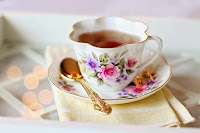Western Wednesday: Medicine in the Olden Days
 |
| Photo: Pixabay/Steve Buissinne |
So what did folks do before modern drugs?
Medicine in the 1700s:
- Headaches, dropsy (swelling), and stomach pains: teas infused with lavender, rosemary, wormwood, sage, foxglove, and mint.
- Fever: Wine “sharpened with lemon juice” or water gruel, orange whey, or weak chamomile tea
- Bleeding was also a popular “cure” that often created more problems than it solved!
- Itchy skin and/or infection prevention: Camphor
- Diarrhea: Opium.
- Arthritis: Apple pectin mixed into juice.
- Insect stings: Honey
- Burns: Cloths soaked in tea
- Indigestion: baking soda solution
- Coughs (and many other ills): Castor oil
- Sore throat: Saltwater gargle (still used today!)
 |
| Pixabay/Terri Cnudde |
A frightening “cure” that was part of medicine for nearly five hundred years was mercury. Thought to rejuvenate the body, it was most popular for sexually transmitted diseases such as syphilis. Unfortunately, it eventually caused deformities before killing the patient.
Another common remedy was a mustard poultice. Used for chronic aches and pains as well as to ease chest congestion, the poultice (a soft moist mass) was made from mustard seed powder spread inside a protective dressing. The key was not to leave it in place for too long because it could cause first-degree burns! The vapor could cause nausea. Other poultices were created with dried crumbled bread mixed with sweet milk. Sometimes egg whites, crushed boiled onions, cornmeal or wheat bran were added.
 |
| Pixabay/ArtActiveArt |
___________________
Ellie Wagner is fine being a spinster school teacher. Then she witnesses a bank hold up and can identify the bandits. Fellow robbery victim Milly Crenshaw happens to run the Westward Home & Hearts Matrimonial Agency so she arranges for Ellie to head West as a mail-order bride. But her groom only wants a business arrangement. Can she survive a loveless marriage?
Banker Julian Sheffield is more comfortable with numbers than with people, but he’s done well for himself. Then the bank president tells him that in order to advance further he must marry in six weeks’ time. The candid, unsophisticated woman sent by the agency is nothing like he expected, but time is running out. When her past comes calling, does he have what it takes to ensure their future?
Purchase Link: http://www.amazon.com/dp/B09QZ14KKZ


Oh, Linda, I KNOW. I have a huge cholera epidemic in my first book and they were so helpless. Glad to live in 2022, even though there are other reasons it's not so fun!
ReplyDeleteI'm always to see ads from the last century advocating the medicinal value of cocaine, or cigarettes to soothe your throat.
ReplyDelete